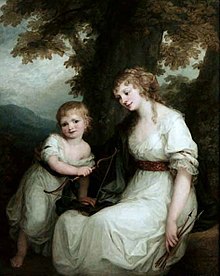Baroness Barbara von Krüdener
| Barbara von Krüdener | |
|---|---|

Baroness von Krüdener and her son Paul, painted in 1786 by Angelica Kauffman
|
|
| Born |
22 November 1764 Rīga, Livonian Governorate, Russian Empire |
| Died | 25 December 1824 (aged 60) Belogorsk, Russian Empire. |
| Spouse | Bourkhardt-Alexis-Constantine Krüdener |
| Father | Otto Hermann von Vietinghoff-Scheel |
| Mother | Anna Ulrika von Münnich |
Baroness Barbara Juliane von Krüdener (November 22, 1764 – December 25, 1824) was a Baltic German religious mystic and author.
Von Krüdener was born in Riga, Governorate of Livonia. Her father, Otto Hermann von Vietinghoff-Scheel, who had fought as a colonel in Catherine II's wars, was one of the two councillors for Livonia and a man of immense wealth. He was a man of rationalistic views and a leading freemason. Her mother, the Countess Anna Ulrika von Münnich, was a granddaughter of Burkhard Christoph von Münnich, a celebrated Russian Field marshal, and a strict Lutheran.
Barbe-Julie de Wietinghoff, better known as Madame von Krüdener (Mme. de Krüdener) later in life, but, as a child, referred to as Juliana, was one of five children born into the wealthy Wietinghoff family.
Her Father, Otto Hermann von Vietinghoff-Scheel, had started accruing his wealth from a young age, for as a young man, he proved to possess a knack for business. With his high ambitions, he entered into commercial enterprises that became highly successful. Some of his treasures included grand properties in Kosse (present-day Viitina, Estonia) and Marienburg, as well as his grandiose townhouse in Riga, where Barbe-Julie was born. Although he was never assigned an official title, he enjoyed the official rank as a privy counselor and as a senator and "would exclaim with pride 'I am Wietinghoff', and behave with all the arrogance of a great noble".
Barbe-Julie’s mother, Anna Ulrika von Münnich von Vietinghoff-Scheel, was herself born into nobility. Her grandfather, the famed Field Marshal Burkhard Christoph von Münnich, despite having been exiled for many years in Siberia, had led many successful campaigns against the Tartars and the Turks. Catherine II also made him one of her favorites, although, sometimes the status was fickle. Mme. de Wietinghoff mirrored her grandfather’s success in her own household, as a mother of five (she bore two sons and three daughters), she was extremely dedicated, despite the death in infancy of her first son, and her physically handicapped eldest daughter (who was both mute and deaf, and whom the family eventually placed in an asylum in 1777).
...
Wikipedia
